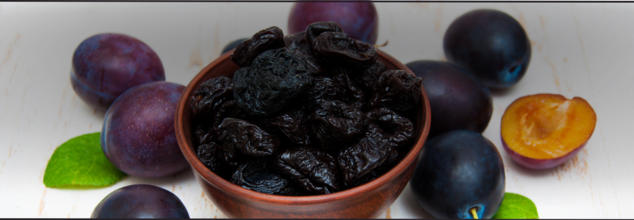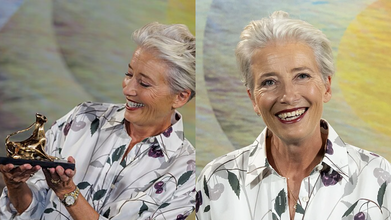- Health Conditions A-Z
- Health & Wellness
- Nutrition
- Fitness
- Health News
- Ayurveda
- Videos
- Medicine A-Z
- Parenting
Why This Seasonal Fruit Should Be Your Dietary Staple Low-Calorie Superfood

Dried vs. Fresh Plums: Which is healthier? (Credit: Canva)
Plums are often overshadowed by flashier summer fruits like cherries and peaches, yet they offer remarkable health benefits that make them a worthy addition to your diet. This small, succulent fruit is low in calories but rich in fiber, antioxidants, and essential vitamins and minerals. Recent research published in the Journal of Nutrition highlights the myriad ways plums can enhance gut, heart, and bone health.
Plums are particularly rich in soluble fiber, which is crucial for digestion and promotes a feeling of fullness. With an average fiber content of 1 to 1.5 grams per plum, this fruit aids in maintaining regular bowel function, decreases inflammation, and helps stabilize blood sugar levels.
Expert recommend that fiber aids in digestion because the insoluble fiber bulks up stools and helps them move through the digestive tract more efficiently. This not only makes plums an excellent choice for digestive health but also contributes to weight management.
Additionally, plums provide essential nutrients like potassium and magnesium. Potassium helps balance sodium levels in the body, which is vital for maintaining healthy blood pressure. Magnesium plays a key role in bone health, making plums an excellent food choice for overall well-being.
The antioxidants found in plums, particularly anthocyanins, combat oxidative stress and improve heart health, thereby lowering the risk of chronic diseases.
Dried vs. Fresh Plums: Which is healthier?
Both fresh plums and their dehydrated counterparts—prunes—offer similar nutritional benefits, although prunes contain higher concentrations of certain nutrients. The concentrated levels of flavonoids and phenolics in prunes offer anti-inflammatory, anti-aging, and antioxidant effects. Furthermore, the combination of high fiber and sorbitol in prunes effectively balances bowel movements.
However, moderation is key. Consuming excessive amounts of plums can lead to stomach upset, and it’s essential to be cautious about vitamin K intake.
While vitamin K is vital for wound healing and bone health, individuals on blood-thinning medications should consult their healthcare provider before significantly increasing their plum consumption, as sudden spikes in vitamin K can interfere with medication efficacy.
Are Plums Good for Diabetes?
Plums can be beneficial for individuals with diabetes due to their low glycemic index and high fiber content. The fiber in plums helps to slow down digestion, preventing spikes in blood sugar levels.
However, portion control is essential, and it’s advisable to consult with a healthcare professional to tailor your diet according to your specific health needs.
Potential Disadvantages of Plums
Another aspect to consider when enjoying plums is their pits. The seed contains amygdalin, which can convert to cyanide and pose toxicity risks if swallowed. Expert suggest being extra careful when biting into or slicing up a plum. You want to try to avoid getting any of the pieces of the seed in your mouth.
How You Can Add Plums into Your Daily Diet
1. Slice fresh plums into your morning oatmeal or yogurt. The natural sweetness will enhance the flavor while adding a nutritious kick to your meal.
2. Keep dried plums (prunes) handy as a quick snack. They’re an excellent source of fiber and can help curb cravings between meals.
3. Use plums in salads or as a topping for grilled meats. Their sweet and tart flavor pairs well with savory ingredients, adding depth to your dishes.
How Long Does It Take To Detox From Alcohol?

Credits: iStock
It is that time of the year, when you will be partying, waking up hungover, and partying again. However, it is important to understand that such a habit takes a toll on you. How long alcohol stays in your body depends on how much you drank and how fast your system processes it. In general, the liver can break down roughly one standard drink per hour. Still, traces of alcohol can show up in tests even 24 hours later. A standard drink usually means about 12 ounces of beer, 4 ounces of wine, or 1 and a quarter ounces of distilled spirits. The more you drink, the longer your body needs to clear it.
Most of the alcohol you consume is processed by the liver. Small amounts leave through urine, sweat, and breath, but there is no shortcut to speed this up. Coffee, cold showers, or fancy detox drinks do not flush alcohol out faster. Time is the only real detox. Giving your liver space to do its job is key.
If someone has been drinking heavily for a long period and suddenly stops, detox can come with withdrawal symptoms. These can range from mild discomfort to serious complications. In some cases, withdrawal can be life threatening, which is why medical supervision is strongly advised for people with a history of heavy drinking.
How Long Can Alcohol Be Detected?
Alcohol stays detectable in the body for different lengths of time depending on the test used and individual factors like age, sex, body weight, food intake, and medications. Urine, breath, and blood tests can usually detect alcohol for 12 to 24 hours after drinking. Hair tests are different and may show alcohol use for up to 90 days.
In most parts of the United States, driving with a blood alcohol concentration of 0.08 grams per deciliter or higher is illegal because it affects judgment and vision. Utah has a lower legal limit of 0.05. Even if you feel sober, alcohol can still be present in your system.
What Happens During Alcohol Detox?
For people with alcohol use disorder or long term heavy drinking habits, withdrawal symptoms may start around eight hours after the last drink. These symptoms often peak between 24 and 72 hours and usually ease within five to seven days. Some psychological effects like anxiety or cravings can last longer.
Early symptoms often include nausea, anxiety, poor sleep, and stomach pain. More severe symptoms can involve high blood pressure, confusion, fever, hallucinations, or seizures. Because of these risks, detoxing in a medical setting is often the safest option. Doctors may prescribe medications to manage symptoms and prevent complications.
Tips for a Safer Detox
If you are cutting back or quitting alcohol, start by talking to a healthcare professional, especially if your drinking has been heavy. Take things one day at a time and focus on small, realistic goals. Choose a calm and supportive environment and avoid triggers that make you want to drink.
Hydration matters. Alcohol dehydrates the body, so water, herbal teas, and electrolyte drinks can help reduce headaches and fatigue. Nutrition also plays a big role. Balanced meals with fruits, vegetables, whole grains, and protein support recovery. Foods rich in B vitamins and magnesium are particularly helpful.
Avoid replacing alcohol with other substances like excessive caffeine or nicotine, as this can worsen stress and cravings. If you notice signs of alcohol dependence, reaching out for professional help is a strong and positive step. Detox is only the beginning, but with the right support, recovery is possible.
At 66, Emma Thompson Lost 8kg by Ditching Diet Culture; Why Say This Approach Works

Credits: Wikimedia Commons
Dame Emma Thompson believes that eating well is never about punishment, food guilt, or obsessively tracking every bite. So what did she do to lose 8 kgs? She ditched diet.
Instead, she follows what she openly calls an “anti-diet” approach. It is not about restriction but awareness. She pays attention to what she eats, fuels her body properly, and still makes space for the foods she genuinely enjoys. That balance is exactly why the method has worked for her long term.
A couple of years ago, the 66-year-old actor and screenwriter lost around 8kg without falling into the trap of rigid rules or trendy superfoods. Rather than cutting entire food groups, Emma focused on consistency, structure, and realism. The result was not just weight loss, but better energy and a healthier relationship with food.
What the Anti-Diet Plan Looks Like in Real Life
Emma worked with Louise Parker, a trainer and nutrition coach known for promoting sustainable habits over quick fixes. The plan itself was calorie-controlled but far from extreme. It included three regular meals a day, each centered on protein to support muscle and keep hunger steady. These meals were paired with slow-digesting carbohydrates such as whole grains, vegetables, and fruit, along with healthy fats for satiety. Two snacks were also built into the day, removing the feeling of deprivation that often leads to overeating later.
The idea was not perfection, but rhythm. Eating regularly helps stabilise blood sugar, reduces cravings, and prevents the binge-restrict cycle that derails many diets. This structure alone can make a significant difference for people who have spent years jumping between extremes.
Why Enjoying ‘Forbidden’ Foods Matters
One of the most refreshing aspects of this approach is that no food is completely off-limits. Emma has spoken openly about enjoying things like cheese, bacon, and even wine occasionally. This is not indulgence for the sake of it. It is a strategic choice.
When people label foods as “bad,” they often end up craving them more. Allowing flexibility removes that psychological pressure. Interestingly, many foods marketed as healthy can be more calorie-dense and less satisfying than traditional options. By eating foods she actually enjoys, Emma avoided the constant feeling of missing out, making the plan easier to maintain over time.
A Rejection of Crash Diet Culture
Emma’s resistance to dieting is deeply personal. Earlier in her career, she tried crash diets and paid the price. She has spoken candidly about how dieting disrupted her metabolism and negatively affected her mental health. Like many people, she was sold the promise of quick results, only to experience long-term consequences.
This honesty highlights an important truth. Extreme restriction may deliver short-term weight loss, but it often damages the body’s ability to regulate hunger and energy. It also fuels a harmful cycle of guilt and rebound weight gain.
The Role of Exercise and Lifestyle Habits
Food was only one part of the equation. Emma also followed an intense fitness routine that included resistance training and ballet-inspired movement. Strength training plays a crucial role in preserving muscle mass, improving metabolism, and supporting long-term weight management. Alongside exercise, sleep, recovery, and mental wellbeing were treated as non-negotiables rather than afterthoughts.
Why This Approach Is Easier to Stick To
Behavioral science consistently shows that
sustainable change comes from habits that fit into real life. Flexible eating patterns that allow enjoyment, regular meals, and adequate nourishment reduce reliance on willpower. When people stop viewing food as the enemy, consistency becomes far more achievable.
Emma Thompson’s “anti-diet” approach works because it respects both biology and psychology. It replaces punishment with practicality, and restriction with balance. That combination is what turns healthy eating from a temporary phase into a lifestyle that actually lasts.
Christmas Delights Mince Pies Urgently Recalled In UK, Know Why

Credits: Canva
Mince pies, a Christmas delight, has been recalled just a few hours before Christmas in UK, over dangerous 'health risks'. The Food Standards Agency (FSA) warned consumers that there could be certain allergies and intolerances that could occur.
Why Are Mince Pies Recalled?
Shallow Brandy Mince Pies by the Bakewell baker have been recalled because it contains milk, "which is not mentioned on the label", noted the FSA notice, issued on December 23.
"The product is a health risk for anyone with an allergy or intolerance to milk or milk constituents," read the FSA notice.
The affected batch include six packs with the following best before dates: 2 February 2026, 3 February 2026, 4 February 2026, and 5 February 2026.
What Does The FSA Notice Say?
Why is the product being recalled?
We have identified that it has been labels incorrectly. Allergen missing. Product contains
milk not declared labels an ingredient has. This may pose a risk to customers.
What should customers do?
Please call the office.
• If you have purchased this product, please do not consume it.
• Return it to the store where it was bought for a full refund. No receipt is required.
FSA issued a "do not consume" notice to warn customer who could be affected.
What Happens When Lactose Intolerant People Consume Milk Or Milk Based Products?
When lactose intolerant people consume milk or milk-based products their bodies cannot properly digest the lactose sugar, leading to uncomfortable digestive symptoms like gas, bloating, cramps, abdominal pain, rumbling sounds, nausea, and diarrhea, usually within 30 minutes to 2 hours, because the undigested lactose ferments in the gut. Severity varies by individual, but it's generally a harmless condition, manageable by limiting dairy or using lactase supplements, and is different from a milk allergy.
Common Symptoms
- Gas & Bloating: Bacteria in the large intestine ferment the lactose, producing gas and causing the gut to stretch.
- Cramps & Pain: Fermentation creates acids and gases, leading to pain around the navel and lower abdomen.
- Diarrhea: Excess water and gas in the colon can result in loose stools.
- Nausea & Vomiting: Some people experience nausea or may even vomit.
- Stomach Noises: You might hear rumbling or "growling" sounds
However, not everyone is lactose intolerant, some may have an allergy from milk, which could lead to different allergy symptoms, which include:
- Hives
- Skin rash
- Stomach upset
- Runny Nose
In fact, severe symptoms could also lead to wheezing, throat swelling, difficulty breathing, vomiting, anaphylaxis.
Are There Any Alternatives To Mince Pies?
There are mince pies available without milk or using any dairy. These dairy-free pastry, which are often made with vegetable oils or vegan butter substitute plant-based milk for brushing, or skipping the milk wash entirely. Traditional pie crusts use ice water as the liquid, so replacing milk is easier.
Always pay attention to be label to know if it contains any ingredient you may be allergic to.
© 2024 Bennett, Coleman & Company Limited

